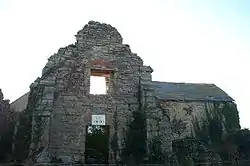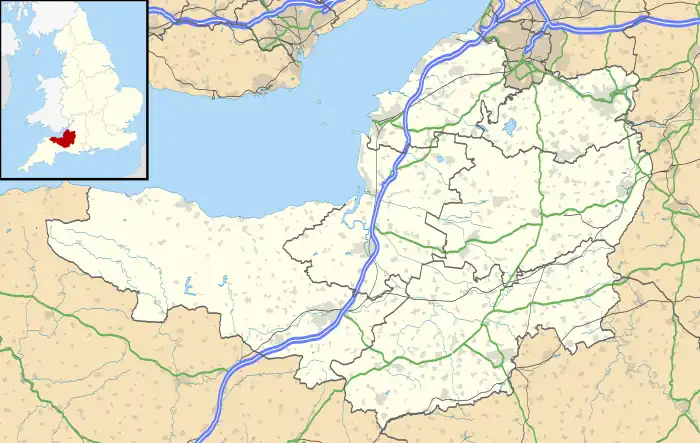 | |
| Monastery information | |
|---|---|
| Established | 1329 |
| Disestablished | Late 14th century |
| People | |
| Founder(s) | Simon de Furneaux |
| Site | |
| Location | Kilve, Somerset, England |
| Grid reference | ST146440 |

Kilve Chantry was a religious site in Kilve, Somerset, England.
The Chantry was founded in 1329, when a brotherhood of five monks was employed to say Mass for their founder, Simon de Furneaux.[1] The Roll of Incumbents shows that several successive chantry priests were incumbents of Kilve parish. It was dissolved in the late 14th century.[2] The chantry seems to have fallen into a ruin long before the dissolution of the monasteries, and for centuries it served as a barn for the adjacent farm.[3]
The building stayed in use for many years, possibly by smugglers, until a fire in 1848,[4] caused by an attempt to destroy evidence of contraband brandy.[5] Some parts of the chantry complex have survived intact and are now 'Chantry' and 'Priory Cottages', but the large solar wing is now ruined.[6]
It is now a Grade II* listed building and Scheduled Ancient Monument,[2] which is listed on English Heritage's Heritage at Risk Register as "very bad" with a priority rating of "A", the highest possible.[7]
References
- ↑ Bush, Robin (1994). Somerset: The complete guide. Wimborne, Dorset: Dovecote Press. ISBN 1-874336-27-X.
- 1 2 "Remains of Chantry, abutting East side of Chantry Cottage, Sea Lane (West side), Kilve". Somerset Historic Environment Record. Somerset County Council. Retrieved 7 January 2010.
- ↑ "Remains of Chantry, abutting east side of Chantry Cottage". historicengland.org.uk. Retrieved 7 October 2007.
- ↑ Waite, Vincent (1964). Portrait of the Quantocks. London: Robert Hale. ISBN 0-7091-1158-4.
- ↑ Byford, Enid (1987). Somerset Curiosities. Dovecote Press. p. 24. ISBN 0946159483.
- ↑ "Kilve chantry, Kilve". Somerset Historic Environment Record. Somerset County Council. Retrieved 7 January 2010.
- ↑ "Remains of Chantry at Kilve, Sea Lane, Kilve, West Somerset, Somerset". Buildings at Risk Register. English Heritage. Archived from the original on 13 July 2012. Retrieved 7 January 2010.